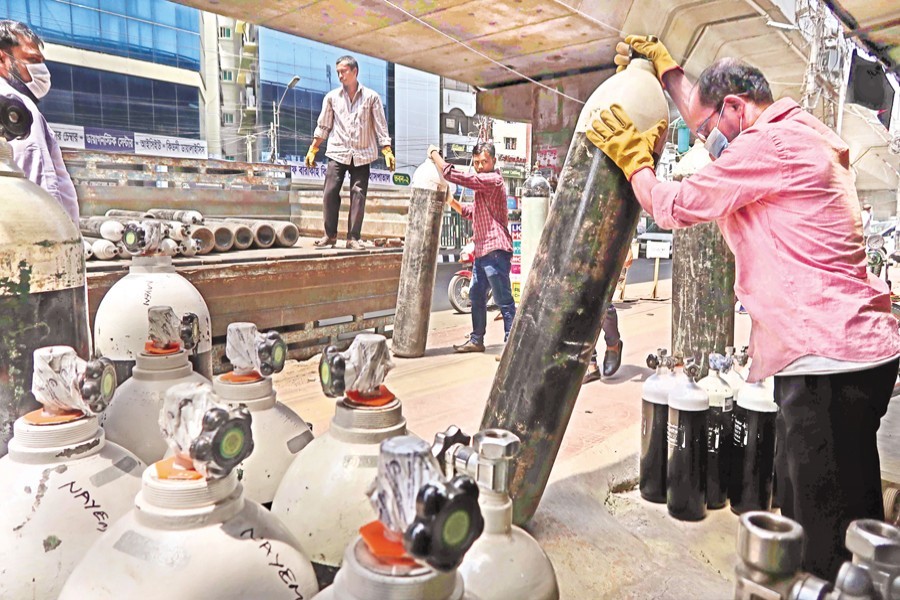Shortage of cylindered oxygen has taken a serious turn, as the demand for the same continues to soar following the steep rise in the number of critical Covid-19 patients in recent times.
Meanwhile, such increased demand for cylindered oxygen has pushed up prices of the life-saving item significantly in the city as well as elsewhere in the country, insiders have said.
In many cases, the hospitals are now asking patients to ensure oxygen cylinders on their own as a condition before admitting them to hospitals due to the high demand and supply shortage, alleged patients and people working to provide oxygen cylinders voluntarily.
There is a daily demand for 180 tonnes of oxygen for hospitals and other related industries, according to the insiders and Directorate General of Health Services (DGHS) information.
Earlier, suppliers brought oxygen cylinders from China, but now most of these come from India, said business insiders and officials.
Linde Bangladesh Ltd daily produces and supplies about 90 tonnes of oxygen and Spectra Oxygen Ltd about 25 tonnes.
Besides, some local small companies - Islam, Meghna and Abul Khair - also produce oxygen on a very small scale and at low cost, officials said.
According to Linde Bangladesh, it sells an oxygen cylinder with a capacity of 1.4 cubic metres at Tk 26,522. One cylinder can be used for 10-11 hours continuously at the usage rate of 2.0 litres per minute.
The daily rental charge is Tk 25, but users have to pay a refundable security deposit of Tk 25,000 for a complete cylinder set.
Maksudul Alam Khandaker Khorshed, councillor of Ward-13 of Narayanganj City Corporation (NCC), and his team members have extended support to Covid-19 patients and their families in Dhaka and Naryanganj since the beginning of the pandemic last year.
From his field experience, he said the patients required more oxygen support in the second wave than the patients in the first wave.
"Before this March we bought oxygen cylinders at a cost of Tk 13,000 each, but now we have to buy the same at minimum Tk 16,000-17,000 from local suppliers."
In many emergency cases, suppliers demand as many as Tk 27,000-28,000 to supply a cylinder from companies like Linde Bangladesh, he noted.
"Its refilling also costs Tk 300-400, which was Tk 200 before March. Despite providing additional money, we are struggling to manage oxygen, as suppliers cannot provide us the item against its huge demand."
"Some unscrupulous traders and hospital authorities are taking advantage of the pandemic situation and charging additional money from patients in the name of oxygen cylinder supply shortage in the market," he alleged.
Mashiur Rahman, an agent of Islam Oxygen Ltd, told the FE: "Earlier there was a demand for rent of cylinders, as people could refill those and reuse."
"But now there is a rush for buying oxygen cylinders, so that we cannot rent empty cylinders. The demand has increased to four to five times, which we cannot meet."
Besides, there is a steady price hike of Tk 300-400 each day on average.
Both of them urged the government to run a drive against the people, who have a tendency of unnecessarily buying and preserving oxygen cylinders for future use, otherwise, it can create an artificial crisis in the market.
Insiders said there are a handful of oxygen producers and suppliers in the country, and their number and production scale need to be increased.
People cannot bear the exorbitant cost to procure oxygen for treatment, if the present situation remains unchanged, they observed.
DGHS Director (Hospital) Dr Md. Farid Hossain Miah also admitted that there is a gradual rise in oxygen demand in the country.
He attributed the high demand for oxygen to more people getting infected by the new variant of coronavirus, as its impact on the lungs is causing serious breathing problems to many.
"There is a demand for about 180 tonnes of oxygen per day, and we are currently able to meet the demand in hospitals."
"Daily infections suddenly rose to on an average 7,000 people from as low as 300 in March. If 10 per cent of the patients require oxygen support, it will be difficult to meet the demand in coming days," he observed.
"We have talks with the supplying companies. Linde Bangladesh has proposed to build another factory in Narayanganj, and we've asked them to go for production as early as possible."
"We've also asked other local companies to raise their production, and urged the authorities concerned to supply more oxygen to hospitals giving a priority over industrial purpose due to the surge in infections."
The DGHS director admitted that some unscrupulous traders are taking advantage of the present situation.
"We have mechanism to monitor them. DGHS has fixed prices with the companies for supplying oxygen in hospitals, and the companies have not hiked their prices."
"There is no permission to sell oxygen cylinders in retail markets for personal use, as only doctors can refer to use of oxygen for patients upon necessary diagnosis."
He discouraged people to store oxygen cylinder, which can impact its supply and price in the market.
He also rejected the possibility of suspending oxygen supply from India, saying that the two big suppliers here are Indian companies. So, there would be no restriction for them to keep the supply on.
nsrrafsanju@gmail.com


